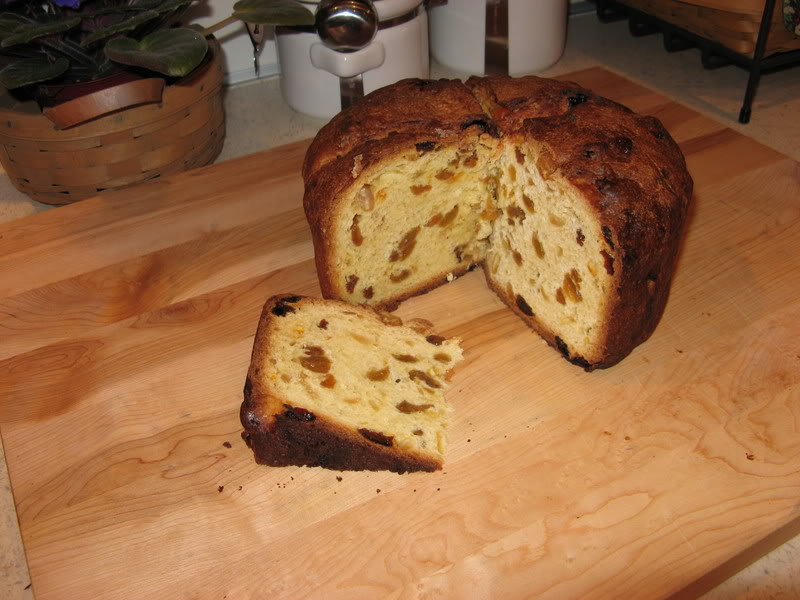Friends of ours are fond of panettone, so I thought that I would try making some for them as a Christmas gift. After much browsing, I decided to use the recipe for Il Panettone Milanese, located here: http://italianfood.about.com/library/rec/blr0946.htm. One of the things that drew me to this one is that it uses a naturally-yeasted biga, instead of commercial yeast. I figured that my sourdough starter (which isn’t especially sour) would yield a good biga and it did.
I should say at the outset that I am pleased with the result, especially since the recipe yields two panettone that are in the medium to large range; one for the friends and one for the baker. There are some things to address, but it is a very satisfying first attempt. Here's a picture:

However, I’m not sure that I would use this specific recipe again, since it does have a few quirks. For instance, the directions for the second-stage dough don’t say when to add the egg yolks (I put them in with the rest of the wet ingredients) and they call for water that isn’t in the ingredient list (I chose not to, since there was no indication of quantity and it looked like a repeat of the instructions for the first dough). The recommended baking temperature is 380F, while Reinhart’s formula recommends a baking temperature of 320F. Since I was improvising with soufflé dishes (one glass and one ceramic) in lieu of panettone molds or papers, I dropped the temperature to 360F and still wound up with rather dark crusts, even after covering them loosely with foil. The recipe gives no indication of baking time, other than that a skewer should come out clean after inserting into the panettone. I pulled them out of the oven when the internal temperature reached 185F, which took almost 1-1/2 hours.
I gave a slice to an Italian acquaintance from Milan and asked for a critique. The first thing that she noted is that my panettone is denser than what she is accustomed to Italy. While I followed the directions and allowed 6 hours for the second rise before baking, it didn’t achieve that almost lacy sponginess of a traditional panettone. There are probably five factors at play. First, additional time for the second rise would probably have helped. My acquaintance says that a friend of hers bakes it frequently and allows it to rise to a point where it is almost ready to collapse. While mine had more than doubled in size, it hadn’t yet reached the wobbly stage when it went into the oven. Second, by baking it in soufflé dishes, the dough had room to expand sideways quite a bit before being forced to expand upward. A regular panettone mold would have encouraged more vertical expansion, which may have improved the texture. Third, this is a very rich dough, especially with fats (a pound of butter and 12 egg yolks!). Fourth, there is almost 2 pounds of fruit in this recipe. With that much fat and that much fruit weighing it down, the dough is going to need every bit of help it can get to fully expand. The last factor, and I don’t have a way to address it, is that Italian bakers have a special rack for inverting and suspending the panettone as it cools. That keeps it from settling and reducing in volume before it is cool and firm. I didn’t notice much, if any, settlement which isn’t too surprising since the crumb wasn’t as spongy as it should have been.
Her second observation was that the candied fruit peel was somewhat bitter. I had noticed that both the orange peel and the lemon peel that I purchased used the full thickness of the peel. Since the white pith can contribute bitterness, that is probably the culprit. I’ll opt for making my own candied peel from just the zest of the lemon and orange in future attempts.
The third observation that she made was that the finished bread was drier than the panettone to which she was accustomed. I had expected it to be very moist because of all of the butter and eggs. Maybe the recipe writer meant it when she said to add water to the second dough. If only she had said how much! A wetter dough might also have been able to expand more during the final rise.
The good news is that the flavor was very close to what my acquaintance knew and loved, so she was happy to have the slice that I brought for her. I’m happy to know that my first attempt is close to the mark on this most important point. Almost everything else can be tweaked and adjusted to get closer to a traditional panettone’s texture.
Best of all, my friends were delighted to receive their panettone.